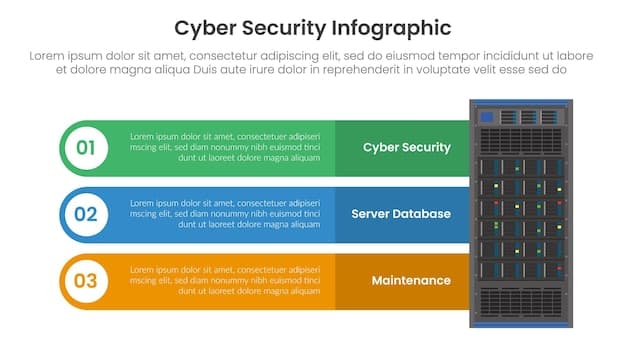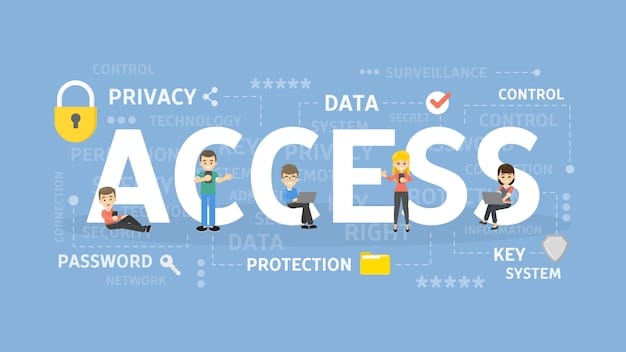Secure Remote Work: Top 5 Password Managers for 50% More Security

Secure your remote work by choosing from the top 5 password managers designed to protect your data and potentially improve your security by 50%, offering robust features and enhanced security protocols.
In today’s digital landscape, secure your remote work: 5 password managers to protect your data and improve security by 50% is more critical than ever. As remote work becomes increasingly prevalent, the need to safeguard sensitive information from cyber threats intensifies. Password managers are essential tools that help you create, store, and manage complex passwords, significantly reducing the risk of data breaches and unauthorized access.
Why Password Managers Are Crucial for Remote Work
Password managers are not just convenient tools; they are a necessity for anyone working remotely. They address the fundamental issue of password security, which is often a weak point in an organization’s cybersecurity posture. By using a password manager, remote workers can improve their overall security and protect sensitive data from potential threats.
The Risks of Password Reuse
One of the most common security mistakes is reusing the same password across multiple accounts. If one of those accounts is compromised, all accounts sharing that password become vulnerable.
Password Manager Benefits
Password managers offer a range of benefits that directly address these risks, including generating strong, unique passwords and securely storing login credentials.
- Strong Password Generation: Creates complex, hard-to-guess passwords.
- Secure Storage: Encrypts and stores passwords, protecting them from unauthorized access.
- Auto-Fill Functionality: Automatically fills in login credentials, saving time and reducing the risk of keylogging.
- Multi-Factor Authentication (MFA): Adds an extra layer of security, requiring more than just a password to access accounts.
In conclusion, password managers are important for remote work because they automatically generate strong passwords, securely storing login credentials, and offering auto-fill functionality that saves you time. They also include MFA that adds another security layer for your protection.
Top 5 Password Managers for Remote Work Security
Selecting the right password manager can be overwhelming, given the multitude of options available. To simplify the process, we have compiled a list of the top 5 password managers, each known for its unique features and robust security measures. These recommendations are based on factors such as security protocols, user-friendliness, and overall value.

1. LastPass
LastPass is a well-established password manager that has been around for over a decade. It offers a user-friendly interface and a range of features, making it a popular choice among both individual users and businesses.
LastPass protects logons, creates strong passwords, and monitors for breaches. It’s useful for personal or business use and it shares passwords safely with other people
2. 1Password
1Password is known for its strong security features and sleek design. It offers a variety of options, including individual, family, and business plans, and is trusted and recommended by millions.
3. Dashlane
Dashlane stands out for its premium features, such as a built-in VPN and dark web monitoring. It offers a seamless user experience and is designed to protect your online identity.
- VPN (Virtual Private Network): Protects your internet connection and masks your IP address.
- Dark Web Monitoring: Scans the dark web for compromised credentials.
- Password Health Score: Evaluates the strength of your passwords and provides recommendations for improvement.
- Secure Notes: Allows you to store sensitive information, such as Wi-Fi passwords and personal IDs, in a secure, encrypted vault.
In summary, the top 5 password managers offer something for everyone. Consider your specific requirements, budget, and desired features when making your choice.
Key Features to Look for in a Password Manager
When evaluating password managers, there are several important features to consider. Not all password managers are created equal, and some offer more advanced functionality than others. By understanding these key features, you can ensure that you choose a password manager that meets your specific needs.

Password Generation
A good password manager should be able to generate strong, unique passwords that are difficult for hackers to crack. Look for a password manager that allows you to customize the length and complexity of generated passwords.
Multi-Factor Authentication (MFA)
MFA adds an extra layer of security to your accounts by requiring more than just a password to log in. It typically involves providing a second form of verification, such as a code sent to your mobile device or a biometric scan.
- Increased Security: Makes it much more difficult for hackers to access your accounts, even if they have your passwords.
- Protection Against Phishing: Helps protect you from phishing attacks, where attackers try to trick you into revealing your login credentials.
- Compliance Requirements: Meets compliance requirements for organizations that need to protect sensitive data.
Understanding the key features of password managers can help protect you from cyber threats. By considering MFA security and many more, you can make a choice that will keep your data safe.
How to Implement a Password Manager in Your Remote Work Setup
Implementing a password manager in your remote work setup is relatively easy, but it requires a systematic approach to ensure a smooth transition. Here are some practical steps to help you get started and maximize the benefits of your chosen password manager.
Step 1: Choose the Right Password Manager
Select a password manager that aligns with your needs and budget. Consider factors such as security features, user-friendliness, and compatibility with your devices and operating systems.
Step 2: Install and Set Up the Password Manager
Download and install the password manager on all your devices, including your computer, smartphone, and tablet. Follow the setup instructions provided by the password manager.
Step 3: Import Your Existing Passwords
Most password managers allow you to import your existing passwords from your web browser or other password management tools. This can save you a significant amount of time and effort.
- Export Passwords: Export your passwords from your web browser or other password management tools in a standard format, such as CSV.
- Import Passwords: Import the CSV file into your password manager.
- Verify Passwords: Verify that all your passwords have been imported correctly and are working as expected.
When implementing a password manager in your remote work setup, choose a password manager that aligns with your needs and budget. Remember to import your passwords as a time saver.
Best Practices for Password Manager Usage
Using a password manager is only the first step. To maximize its effectiveness, it’s essential to follow best practices and maintain good password hygiene. Here are some tips to help you get the most out of your password manager:
Regularly Update Your Passwords
Make it a habit to regularly update your passwords, especially for your most important accounts. Password managers make this easy by generating strong, unique passwords for you.
Enable Multi-Factor Authentication (MFA)
Enable MFA for all accounts that support it, as it provides an extra layer of security. Password managers can often store and manage your MFA codes, making it even more convenient to use.
Secure Your Master Password
Your master password is the key to your entire password vault, so it’s crucial to keep it safe. Choose a strong, memorable password that you don’t use anywhere else.
- Strong and Unique: Your master password should be at least 12 characters long and contain a mix of uppercase and lowercase letters, numbers, and symbols.
- Memorability: Choose a password that you can easily remember without writing it down.
- Don’t Reuse: Never use your master password for any other accounts.
In conclusion, the effectiveness of password managers depends on how well these are implemented. To get the most out of your password manager, make it a habit to update your passwords, secure your master password, and enable MFA.
The Future of Password Management and Remote Work Security
As technology continues to evolve, password management is also expected to advance. In the future, we may see even more sophisticated security features, such as biometric authentication and behavior-based authentication. These advancements will further enhance the security of remote work environments.
Biometric Authentication
Biometric authentication uses unique biological traits, such as fingerprint scanning and facial recognition, to verify your identity.
Behavior-Based Authentication
Behavior-based authentication analyzes your typing patterns, mouse movements, and other behaviors to determine whether you are who you claim to be. This can add an extra layer of security, as it’s difficult for someone to mimic your unique behavior.
The future of secure remote work relies on modern advances for safe storage of data. From the use of biometric authentication and other measures, password managers continue to ensure stronger remote work environments.
| Key Point | Brief Description |
|---|---|
| 🔑 Password Managers | Essential for creating and securely storing complex passwords. |
| 🛡️ MFA | Adds an extra layer of security beyond just a password. |
| 🔄 Regular Updates | Keep passwords updated for stronger security. |
| 🌐 VPN | Protects internet connection and masks IP address for enhanced privacy. |
FAQ
▼
Password managers enhance your security by generating and storing strong, unique passwords for all your accounts and protecting against password reuse.
▼
Yes, reputable password managers use strong encryption to protect your data, making it very difficult for someone to access your passwords without your master password.
▼
Recovery processes vary. Some managers offer recovery options, but if these fail you could lose access to your stored passwords, so be sure to pick a strong password to remember.
▼
Yes, most password managers offer seamless synchronization across multiple devices, including computers, smartphones, and tablets, ensuring you always have access to your passwords.
▼
Many password managers offer additional security features such as VPN and Dark Web monitoring to further enhance your online protection, depending on the plan and features.
Conclusion
In conclusion, securing your remote work with the right password manager is a proactive step towards enhancing your digital safety. By choosing a reliable tool, implementing best practices, and staying informed about future advancements, you can significantly mitigate the risks associated with remote work and protect your sensitive data.





